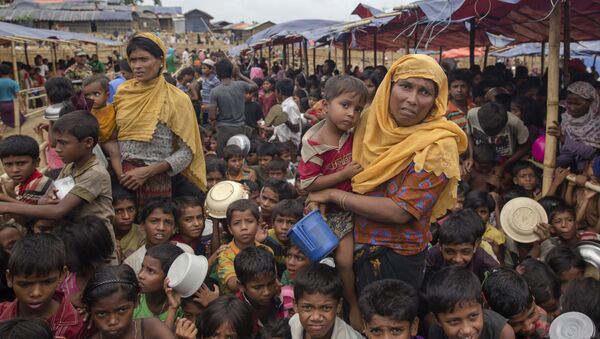New Delhi (Sputnik) — Young girls living in a shell of fear, expecting mothers struggling for basic health care and nutrition and fear of rampant child marriage are what haunt women at the Rohingya refugee camps in Bangladesh.
The overflowing refugee camps lack basic sanitary necessities like toilets and water, making women the most affected of the 6 million Rohingya refugees, according to relief organizations working with the people who took shelter in the Bangladeshi camps after fleeing atrocities in neighboring Myanmar.
"The world must know the vulnerability of the female population among the Rohingyas and act accordingly with utmost urgency. Of the total refugees, our estimates say that 70 percent are women and are living in dire conditions," Action Aid Bangladesh Country Director Farah Kabir told Sputnik.
Kabir and her organization are working in the refugee camps with a special focus on women and are engaged in building toilets and installing other basic amenities in the camps in coordination with the nodal relief agency of Bangladesh.
A study by Action Aid reveals that a considerable number of women in the camps are pregnant and ready to deliver in the filthy conditions.
"Around 70,000 women in the camps are looking forward to deliver their kids and the health needs of these would-be mothers should be paramount for any relief priority," Farah Kabir said.
Drinking water and a safe place to take a bath are some of the greatest challenges to the inmates of the camps.
"On intervention, it has been found that women in the camps are living under huge stress. Young girls are living in a shell whereas grownups manifest depression due the inhuman psycho-social conditions," Kabir said.
Reports in international media have suggested the existence of prostitution rackets and a strong nexus of pimps within the refugee camps, making young girls vulnerable to flesh trade and prostitution. However, on being asked about the existence of such rackets, Kabir said, "we too have heard of such things happening but cannot confirm any such incidents."


